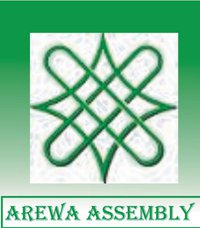On the Northern Knot: What is it?
Ibraheem A. Waziri
July 6, 2013
NewsRescue-Many have asked that I should shed more light on the following I wrote in the essay, Re: Qur’an on the Resurrection of Jesus, which appeared in this column on the 26th April, 2013:
“As far back as the 14th century there were Christians, at least, in the area that constitutes the present Northern Nigeria. In fact the symbol, the mark, the identity of Northern Nigeria today is the Northern Knot which is an ancient form of a North African Christian cross. The records of history do not reflect many skirmishes even when the area decided to become Muslim with the subsequent contacts with the Arabs.”

What I am saying is a significant part of Northern Nigeria was Christian even before the coming of the colonialists. I do not know why Sir Ahmadu Bello and his comrades (May Allah rest their souls) chose to adopt the Northern Knot as Northern Nigeria’s insignia but it is originally a Christian cross used by North African Christians.
Historians say there used to be among our kings of yore days around Gobir a certain one that was referred to as Sarkin Gobir Mai Sak’andami meaning, Gobir king who wore a cross. While I don’t think Christianity then earned the status of a state religion I am almost convinced there were indeed a significant number of Christians around. There used be Christians known as Isawa the term, I think, might have come from the Arabic form of Jesus, which is Isa. It is also possible that Muslims named them so after learning of what they stood for faith wise. The Muslims named many others like Maguzawa and so.
Another thing to consider also is the fact that actual non latinized names of Jesus in Hebrew and Aramaic (languages of the Jews which Jesus spoke himself) are Yeheshua and Esau respectively. Even though Aramaic is an ancient form of Arabic language, the name Esau may have reached Hausaland before Arabs came with Islam and the Isawa term may have gotten ground.
My inquiry into these things began when in 2009 we sought to renovate our family house and that Northern Knot was used as part of the decorations in the front of the house. I asked about its origin and none could tell. Yes it means unity in diversity but its origin is what? I went to Arewa House Kaduna but no one could tell me anything. I tried department of history ABU Zaria and they could not explain. I asked an ethnographer, Prof. Abdallah Uba Adamu but he could not tell. I asked many others until my cousin Dr. Abdullahi Jaafar found out from Usman Danfodio University, Sokoto and on a strong authority that actually there was Christianity here before Islam and told of the story of Sarkin Gobir Mai Saka’andami in that light.

Celtic knots are a variety of knots and stylized graphical representations of knots used for decoration, used extensively in the Celtic style of Insular art. These knots are most known for their adaptation for use in the ornamentation of Christian monuments and manuscripts, such as the 8th-century St. Teilo Gospels, the Book of Kells and the Lindisfarne Gospels. Most are endless knots, and many are varieties of basket weave knots.
Subsequently, I learnt from the work of Kenny Joe of 1983, The Catholic Church in Tropical Africa 1445-1850. Ibadan: Ibadan University Press., as referred to by Umar Habila Dadem Danfulani in his paper, Religious Conflict on the Jos Plateau, that the Northern Knot is a residue of Christianity in the present Northern Nigeria after the Nubians attempted to introduce it through mission work between 1512 – 1514.
It should be remembered either that as far back as 325AC there used to be a very influential priest in Christendom by the name Arius who was originally a Libyan. Libya shares border with Niger and so close to Hausaland. As far back as 373AC there was a bishop consecrated by Athanasius in Nubia which is an area in what is now partly Sudan and partly Egypt. Yes Sudan is a walking distance from Hausaland in those years. Although some may argue that at that time the Hausa were non existent but the area may have been peopled by humans who knew how to practice a faith.
Ibrahim Waziri is an editor of KadunaVoice.com, he also writes at RGUILD






